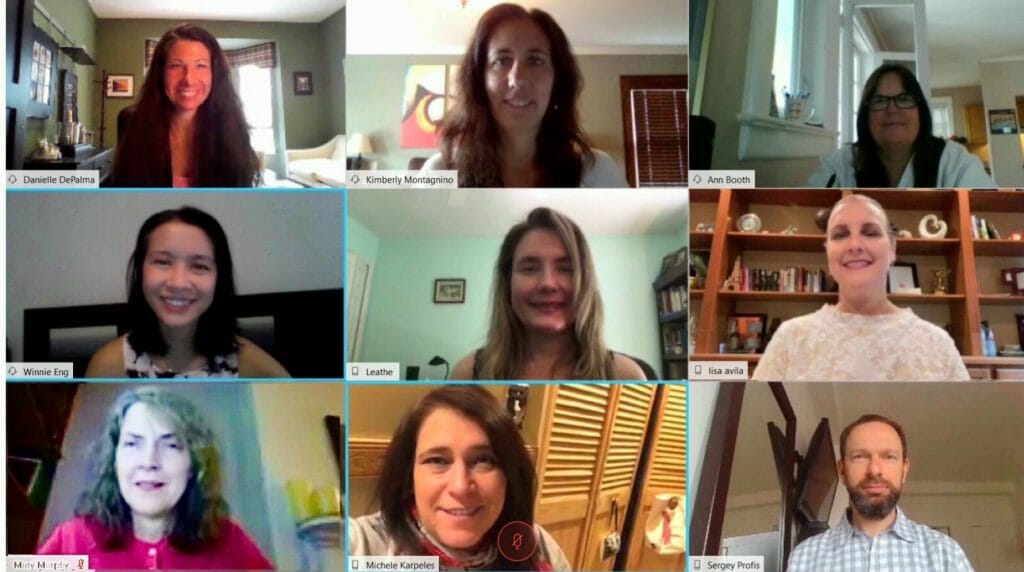
When the COVID-19 pandemic necessitated CUNY’s transition to distance-learning, the more than 12,000 students enrolled at the College of Staten Island continued their courses online for the remainder of the Spring semester. This meant that the more 150 students who visit the CSI Counseling Center each week would not be on campus for nearly three months, and potentially for far longer than that. For Counseling Center Director Ann Booth and the rest of the counselors, it also marked the beginning of their efforts to bring the Center’s services online.
Soon after the announcement of the transition to distance-learning, the Counseling Center had moved to an online platform and was offering virtual sessions to students, but just one week later, those working in the Counseling Center, along with the majority of CUNY employees, were told not to report to work and to begin the process of working from home. Booth credits being able to begin moving online ahead of the campus closure with easing the shift from conducting sessions in-person to doing so remotely. “Virtual counseling began before our staff left campus,” Booth said. “This gave us the weeks ahead to begin planning.”
Although the counselors have all become much more acclimated with conducting sessions online, the inability to meet with students face-to-face has not come without its challenges. “Philosophically, the art of therapy is a human connection,” Booth said. “Nothing can replace a face-to-face meeting.” However, Booth and the rest of the counselors have worked hard to replicate the in-person meetings that have formed the foundation of their relationships with students as they offer both telephone and video counseling to those seeking support. Most students have opted for the video.
In addition to the challenges presented by being unable to interact with students face-to-face, the issue of students finding the privacy required to conduct sessions has also become an obstacle. It hasn’t been unusual for welcome guests such as pets to join students during their sessions with counselors, but in other cases, siblings and family members have made it very difficult for students to receive therapy in private. Booth describes this issue as “the biggest challenge we are seeing right now,” and says that “there have been a lot of distractions and prohibiting factors for students reaching out for help.”
For the approximately 125 students who have been able to participate in virtual counseling sessions each week, the pandemic has almost always been a part of the discussion. According to Booth, “the stress that students are experiencing right now stems from the upheaval in their daily routines and their lives, being disconnected from social supports, and financial struggles.” On top of that, she says that more than half of the students she has spoken to have been directly impacted by the virus. “Some have loved ones who have died. Others have loved ones who are sick. There is also the fear of contracting the virus as well. We’re working with students to identify the areas of their lives over which they have control.”
The Counseling Center hasn’t yet seen an influx of new clients as a result of the pandemic, but they have maintained nearly all of their relationships with existing clients.
Challenges stemming from the pandemic have not only impacted students who seek the services of the Counseling Center. The counselors who have been working to support them have experienced a great departure from their typical routine as well. Sharing the feelings of many students who are missing life on campus, Booth says, “we miss the campus too, and we miss each other.”
Like many who have made the transition to working from home during the pandemic, Booth and the rest of her staff have also found themselves working more hours than ever before. This workload isn’t an issue for the Center’s Assistant Director, Mary Murphy, who is happy to provide students with the services that weren’t available to her during her time in school. “I absolutely think this is a wonderful service that we have,” she said. “As counselors, we are privileged to be doing this work and to be able to help students at this point in their careers and in their lives.”
To help students cope with this pressure, Booth emphasizes the importance of sharing information. In an effort to provide students with additional informational resources, the Counseling Center has started an Instagram page, csicounseling, and launched a series of presentations, “Tuesday Talks” and “Wednesday Wise,” both available at their Website, www.csi.cuny.edu/students/counseling-center.
The Counseling Center also continues to offer nearly all of their previously existing services online including individual counseling, couples counseling, medication services, a monitored email account that provides appointments for same-day virtual counseling, and a 24-hour telephone counseling service for those in need of immediate support. These services, confidential and free for all students, can be accessed by contacting the Counseling Center at counseling@csi.cuny.edu, and emergency support is immediately available by phone at 718.982.2391.
The counselors look forward to the return of walk-in services that will come with the re-opening of campus, but Murphy encourages those in need of support to reach out now. Booth’s message to those who feel they may require support at this time is a simple one: “You do not have to suffer alone. We are here for you.”
By Joseph Foreman















